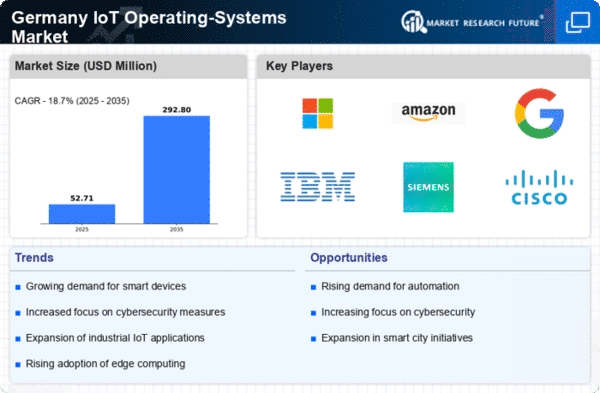Expansion of Smart Cities
The expansion of smart cities in Germany is a pivotal driver for the iot operating-systems market. As urban areas increasingly adopt IoT solutions to enhance infrastructure, transportation, and public services, the demand for sophisticated operating systems rises. By 2025, it is anticipated that investments in smart city projects will exceed €5 billion, creating a substantial market for IoT operating systems. These systems are essential for managing the vast amounts of data generated by interconnected devices, ensuring efficient communication and operation. Consequently, the growth of smart cities is likely to stimulate advancements in the iot operating-systems market, as municipalities seek reliable and scalable solutions.
Government Initiatives and Support
Government initiatives in Germany are playing a crucial role in fostering the growth of the iot operating-systems market. With the implementation of policies aimed at promoting digitalization and innovation, the government is providing financial incentives and support for IoT projects. In 2025, public funding for IoT initiatives is projected to reach €1 billion, significantly impacting the development of operating systems tailored for IoT applications. This support not only encourages research and development but also facilitates collaboration between public and private sectors, thereby enhancing the overall ecosystem for IoT technologies. As a result, is expected to benefit from increased investment and innovation.
Increased Focus on Energy Efficiency
is driven by a heightened focus on energy efficiency across various sectors in Germany. As businesses and consumers alike become more environmentally conscious, the demand for IoT solutions that optimize energy consumption is growing. In 2025, it is estimated that the energy management sector will account for approximately €3 billion in the iot operating-systems market. Operating systems that facilitate real-time monitoring and control of energy usage are essential for achieving these efficiency goals. This trend not only supports sustainability efforts but also encourages the development of innovative operating systems tailored to energy management applications.
Rising Demand for Smart Manufacturing
The iot operating-systems market in Germany is experiencing a notable surge in demand driven by the increasing adoption of smart manufacturing practices. As industries strive for enhanced efficiency and productivity, the integration of IoT technologies becomes paramount. In 2025, it is estimated that the smart manufacturing sector will contribute approximately €20 billion to the overall market. This shift necessitates robust operating systems capable of managing vast networks of connected devices, thereby propelling growth in the iot operating-systems market. Furthermore, the push for automation and real-time data analytics in manufacturing processes indicates a sustained need for advanced operating systems that can seamlessly integrate with existing infrastructure.
Advancements in Connectivity Technologies
Advancements in connectivity technologies are significantly influencing the iot operating-systems market in Germany. The rollout of 5G networks and improvements in wireless communication are enabling faster and more reliable connections between devices. This technological evolution is expected to enhance the performance of IoT applications, thereby increasing the demand for advanced operating systems capable of leveraging these new capabilities. By 2025, the market for connectivity solutions is projected to grow by 30%, directly impacting the iot operating-systems market. As businesses seek to capitalize on the benefits of enhanced connectivity, the need for robust operating systems that can support these innovations will likely intensify.
















